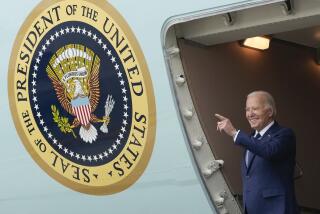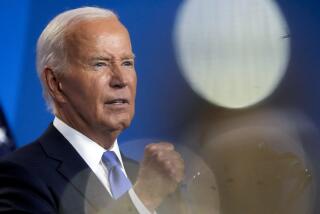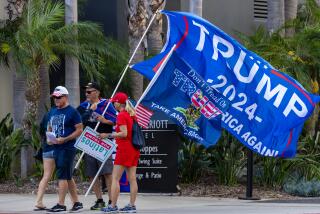Commission Pushes for Shorter Political Conventions
- Share via
WASHINGTON — A bipartisan commission recommended Thursday that the political parties shorten their presidential nominating conventions by one night, on the theory that the streamlining will prod the parties into making the conventions more appealing and thus increase voter interest.
In exchange for having the convention shortened, the panel’s report recommended that the television networks reserve the three hours of broadcast time they save for use by the political parties during the fall, when the campaign for the White House will be in full swing.
Underlying the commission’s work was concern about declining voter participation in presidential elections--a problem that seems even more stark when contrasted with the surge of enthusiasm for political freedom in Eastern European countries.
“Despite this rush to democracy, we have been fortunate in this country when 50% of eligible Americans turn out to vote,” said former Republican National Chairman Frank J. Fahrenkopf Jr., who co-chaired the commission with former Democratic National Chairman Charles T. Manatt. “This is a tragedy and something must be done about it.”
The commission focused its attention on the national conventions because they have lost the power they once had to choose party nominees and have been criticized as being dull and irrelevant. No longer do all the television networks cover these sessions gavel-to-gavel as they did in the past.
The point of the commission recommendation to compress the convention schedule from the traditional four full days to four days and three nights, Fahrenkopf said, is to “challenge the parties to put something on television that will attract the interest of people.” The report made no specific recommendations about how this might be done.
In a dissent from the recommendation to shorten the conventions, commission members Ken Bode and Marvin Kalb, both former NBC news correspondents said: “We believe the parties already have gone too far in fashioning the schedule and events of nominating conventions to what they think will make interesting television. This is a major reason why many journalists, print and broadcast, believe the parties are merely hosting ‘media events.’ ”
In calling on the networks to reallocate the three hours that would have been used for covering the fourth night of the convention, the commission recommended as one possible format dividing the time between the parties into several back-to-back, half-hour segments. During these periods, the report suggested, only the presidential and vice presidential nominees would appear.
The commission also recommended that both parties make a major effort to increase the number of citizens who use the checkoff on their income tax returns to set aside $1 for federal campaign funding, which is used to pay for the conventions and to subsidize the campaigns of presidential candidates. Federal Election Commission figures show that the checkoff rate has declined from nearly 29% in 1980 to just over 20% in 1988, yielding annual total revenues of $33 million against total expenditures of more than $158 million.
At the present rate of checkoff participation, the FEC projected that the campaign finance fund, which had a surplus of $52 million in 1988 after the campaign, would be in the red by $131.5 million by 1996.
More to Read
Get the L.A. Times Politics newsletter
Deeply reported insights into legislation, politics and policy from Sacramento, Washington and beyond. In your inbox twice per week.
You may occasionally receive promotional content from the Los Angeles Times.










